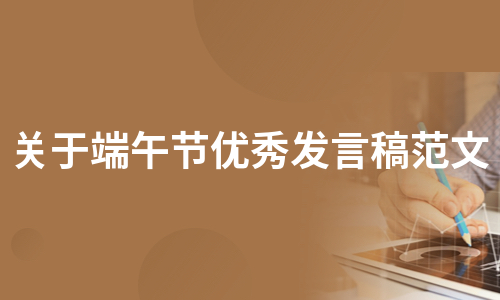在今天的社会中,演讲被广泛地运用,它的形式包括称呼、开场白、主旨、结语等。下面是知猫文档的编辑“笨香蕉”为各位读者细心整理的关于端午节优秀发言稿范文,希望对你的写作有所帮助,更多内容可以点击首页获取哦,如您觉得文章不错还可以按住快捷键Ctrl+D收藏本网站,欢迎转发分享、复制、下载!

关于端午节优秀发言稿范文 第1篇
亲爱的老师、同学们:
今天是中华民族的传统节日——端午节。
每到这天,人们就会吃棕子、赛龙舟。可是,你知道吗?现在吃棕子可要注意了,棕叶一开始是青绿色的,正常在煮过之后叶子都会呈深绿偏灰黑色或是暗黄色,不会呈青绿色,如仍是青绿色的棕子,可千万别吃,因为这种棕叶含有大量的铜。
今天早上,爸爸叫我起来吃早饭,我一起来,就问:“有棕子吃吗?”“没有,吃稀饭。”我说:“啊,不吃棕子还算是过端午节?”“噢,好吧,我和你妈妈现在去菜市场买,你在家看书等着。”
没想到爸爸和妈妈一回家,爸爸急忙换了一身迷彩军装要出门,我急忙问:“爸爸,你干什么去呀?”,爸爸只说了一句“单位有事”就出门了。
爸爸出门之后,妈妈问我饿不饿,要不要先吃点饭?我说:“现不饿,等爸爸回来之后一起吃吧!”可没想到一直等到十一点多,爸爸才终于回来,妈妈笑着说:“看来我们今天只要吃两顿饭了。”然后,妈妈和我就开始端菜上桌,我们一家三口说着笑着一起高高兴兴的吃饭了。
吃完饭,我们一起观看东方卫视的笑傲江湖节目,笑得我肚子都疼了。
关于端午节优秀发言稿范文 第2篇
亲爱的`老师、同学们:
农历五月初五是端午节,又称端阳节、端五、重午、午日、夏节、午日节、五月节、艾节等等。
每年的这一天人们都要举行必不可少的活动,门上插上艾草、吃粽子、佩带香囊、赛龙舟等。今年x月x日是农历五月初五,我们即将迎来中国一年一度的传统节日——端午节。
那么端午节是怎么来的呢?据说,两千多年前,楚国的大夫屈原关心人民疾苦,受到人民的爱戴。他投江自尽后,楚国人民纷纷赶到汨罗江边,向他表示哀悼。人民划着船在江上来回打捞他的遗体,这就产生了赛龙舟的习俗。吃粽子的习俗是人们把包着楝树叶和彩丝的饭团扔到河里,以表达对屈原的祭奠。所以每年农历五月初五定为端午节。
每逢端午节,家家户户都要吃粽子,挂上艾草,佩带香囊,赛龙舟,举行诗会,纪念屈原,庆祝节日。
然而,随着时代的变化,越来越多的外国文化已经渗透到我们的生活中,曾经热闹的节日已逐渐被人们遗忘,我们似乎不再关心几千年来的传统文化,而是把更多的注意力转向西方节日,如“圣诞节”和“愚人节”。当我们还沉浸在西方节日的欢声笑语中时,2006年,韩国向联合国教科文组织申请端午节为其非物质文化遗产,并将其列入国家遗产名录。
听了这些,我们是什么样的心情,这不仅仅是一个传统节日的得失,不仅仅是少了一些庆祝活动,更重要的是,它是中华民族的传统节日,它保留了中华民族独特的文化记忆。每一个传统节日,都可以加强中国民族凝聚力和向心力。但是现在,这个我们度过了两千多年的传统节日却成为了其他国家的民族遗产,我们是多么的尴尬和无助。
中国传统节日丰富多彩,文化内涵丰富,保留了先民独特的文化记忆。我们应该感激和敬畏祖先创造的历史和文化遗产。
同学们,我们是中华民族的栋梁,中华文明需要共同传承,发扬光大。希望大家不要冷落自己的传统节日,让中华文明在中国的土地上铸造辉煌!
谢谢大家,我的演讲到此结束,祝大家端午节快乐!
关于端午节优秀发言稿范文 第3篇
老师们、同学们:
大家好!
端午节,门插艾,香满堂,吃粽子,洒白酒,龙舟下水喜洋洋。这些,都是曾经端午节上最热闹的活动,然而,随着时代的变迁,社会节奏的加快,外来文化的大举入侵,中国人不再眷顾流传几千年的中国传统文化,而是将目光转向了“圣诞节”“愚人节”这样的节日,面对这种现状,我们不得不感到悲哀,发出“端午节是否不再姓“中”这样的疑问。
无庸讳言,这些年来,我国的传统节日,似乎总离不开吃。端午节吃粽子,清明节吃青团,元宵节吃汤圆,中秋节吃月饼,春节更不在话下,大鱼大肉让你吃到不想吃。农耕社会对饥饿的恐惧,形成了我国传统节日最鲜明的风俗——吃。如今,满足了温饱需求的人们正在奔向全面小康,什么时候都有的吃,想吃多少都可以,传统节日的吸引力一下子失去了特有的魅力。
在继承传统文化方面,我们守着“聚宝盆”却不善于保护和挖掘。比如文字,当代青年有几个熟识并能运用繁体字?连文字都不认识又如何了解古代文化?再比如造纸,我国造纸工业化生产的结果是传统手工业的流失,许多高质量的宣纸要到日本或韩国才能买到,他们不但继承了我们的传统造纸技术,还有新的发展。就拿端午节来说,它已融入各个临近国家的文化中,形成了独特的生命力——在新加坡,每年端午节举行的国际龙舟邀请赛闻名于世;在韩国,端午节被称为车lun节,是插秧结束后祈求丰年的日子。在很长一段时间里,中国人着眼于创新,却往往容易忽视对传统的坚持,文化的缺失必然导致精神断层甚至扭曲,而精神文明的再次断层又将带来什么?有句话说的好:只有民族的才是世界的。在面临全球经济一体化的今天,该如何保护与继承我们的传统文化,显然已是一个不容回避的问题。而现时的洋节兴盛与传统节日衰弱间的反差,更凸显了这个问题的迫切性
其实,不光是传统节日,整个中国民族民间文化的生存环境如今都面临着经济全球化和现代化的挑战。一些西方发达国家凭借强大的综合国力,先进的科技手段和发达的文化传播手段,积极传播西方的价值观念和生活方式,对包括中国在内的发展中国家的民族民间传统文化生态造成了一定的冲击。
中国的传统节日五彩缤纷,文化内涵丰厚,留存着人类独特的`文化记忆,对祖先创造的历史文化遗存,必须怀有敬畏之心,必须高度重视。我们是中华民族的栋梁之才,中华文明需要我们共同传承!
关于端午节优秀发言稿范文 第4篇
亲爱的老师和同学们:
大家早上好!
今天我们的主题是《端午节的由来》。
关于端午节的起源有很多传说,其中纪念屈原的说法最为流行。屈原是中国古代伟大的爱国诗人,生于2000多年前的战国时期的楚国。他为人正直,学识渊博,才华横溢,在楚国占有重要地位。因为主张坚决对抗秦国侵略,被攻击拒绝,被楚王赶出朝廷。屈原非常生气
割,他不愿意看到国破家亡的惨景,就在农历五月五日这一天,怀抱石块,跳进了泪罗江。当时他62岁。
百姓们爱戴屈原,当听到他自杀的消息后,纷纷划着船奔向江中,去打捞屈原的遗体,但没能找到。他们怕江中的鱼虾会咬食屈原的遗体,又纷纷把江米装迸竹筒,扔到水里,想用江米喂食鱼虾来保护屈原的`遗体。从此,每年的五月初五,人们都会自发地来到江边,悼念屈原,还要划着船冲进汹涌的波涛,象征人们争相打捞屈原遗体,以此来寄托对屈原的哀思。久而久之,我国南方就形成了端午节赛龙舟的习俗。因此,端午节又成了纪念屈原的节日。
同学们,屈原因为热爱祖国、关心百姓疾苦而受到人们的爱戴。当我们津津有味地吃棕子、观看赛龙舟时,不要忘记2000多年前那位爱国大诗人屈原。
关于端午节优秀发言稿范文 第5篇
the dragon boat festival, the 5th day of the 5th lunar month, has had ahistory of more than 2,000 years. it is usually in june in the gregoriancalendar.
there are many legends about the evolution of the festival, the mostpopular of which is in commemoration of qu yuan (340-278 bc). qu yuan wasminister of the state of chu and one of china‘s earliest poets. in face of greatpressure from the powerful qin state, he advocated enriching the country andstrengthening its military forces so as to fight against the qin. however, hewas opposed by aristocrats headed by zi lan, and later deposed and exiled byking huai. in his exiled days, he still cared much for his country and peopleand composed immortal poems including l sao (the lament), tian wen (heavenlyquestions) and jiu ge (nine songs), which had far-reaching influences. in 278 bc, he heard the news that qin troops hadfinally conquered chu‘s capital, so he finished his last piece huai sha(empacing sand) and plunged himself into the miluo river, clasping his arms toa large stone. the day happened to be the 5th of the 5th month in the chineselunar calendar. after his death, the people of chu crowded to the bank of theriver to pay their respects to him. the fishermen sailed their boats up and downthe river to look for his body. people threw into the water zongzi(pyramid-shaped glutinous rice dumplings wrapped in reed or bamboo leaves) andeggs to divert possible fish or shrimp from attacking his body. an old doctorpoured a jug of reaglar wine (chinese liquor seasoned with realgar) into thewater, hoping to turn all aquatic beasts drunk. that‘s why people later followedthe customs such as dragon boat racing, eating zongzi and drinking realgar wineon that day.
dragon boat racing is an indispensable part of the festival, held all overthe country. as the gun is fired, people will see racers in dragon-shaped canoespulling the oars harmoniously and hurriedly, accompanied by rapid drums,speeding toward their destination. folk tales say the game originates from theactivities of seeking qu yuan‘s body, but experts, after painstaking andmeticulous research, conclude that dragon boat racing is a semi-religious,semi-entertaining program from the warring states period (475-221 bc). in thefollowing thousands of years, the game spread to japan, vietnam and britain aswell as china‘s taiwan and hong kong. now dragon boat racing has developed intoan aquatic sports item which features both chinese tradition and modern sportingspirit. in 1980, it was listed into the state sports competition programs andhas since been held every year. the award is called "qu yuan cup."
zongzi is an essential food of the dragon boat festival. it is said thatpeople ate them in the spring and autumn period (770--476 bc). in early times,it was only glutinous rice dumplings wrapped in reed or other plant leaves andtied with colored thread, but now the fillings are more diversified, includingjujube and bean paste, fresh meat, and ham and egg yolk. if time permits, peoplewill soak glutinous rice, wash reed leaves and wrap up zongzi themselves.otherwise, they will go to shops to buy whatever stuff they want. the customof eating zongzi is now popularin north and south korea, japan and southeast asian nations.
on dragon boat festival, parents also need to dress their children up witha perfume pouch. they first sew little bags with colorful silk cloth, then fillthe bags with perfumes or herbal medicines, and finally string them with silkthreads. the perfume pouch will be hung around the neck or tied to the front ofa garment as an ornament. they are said to be able to ward off evil.



